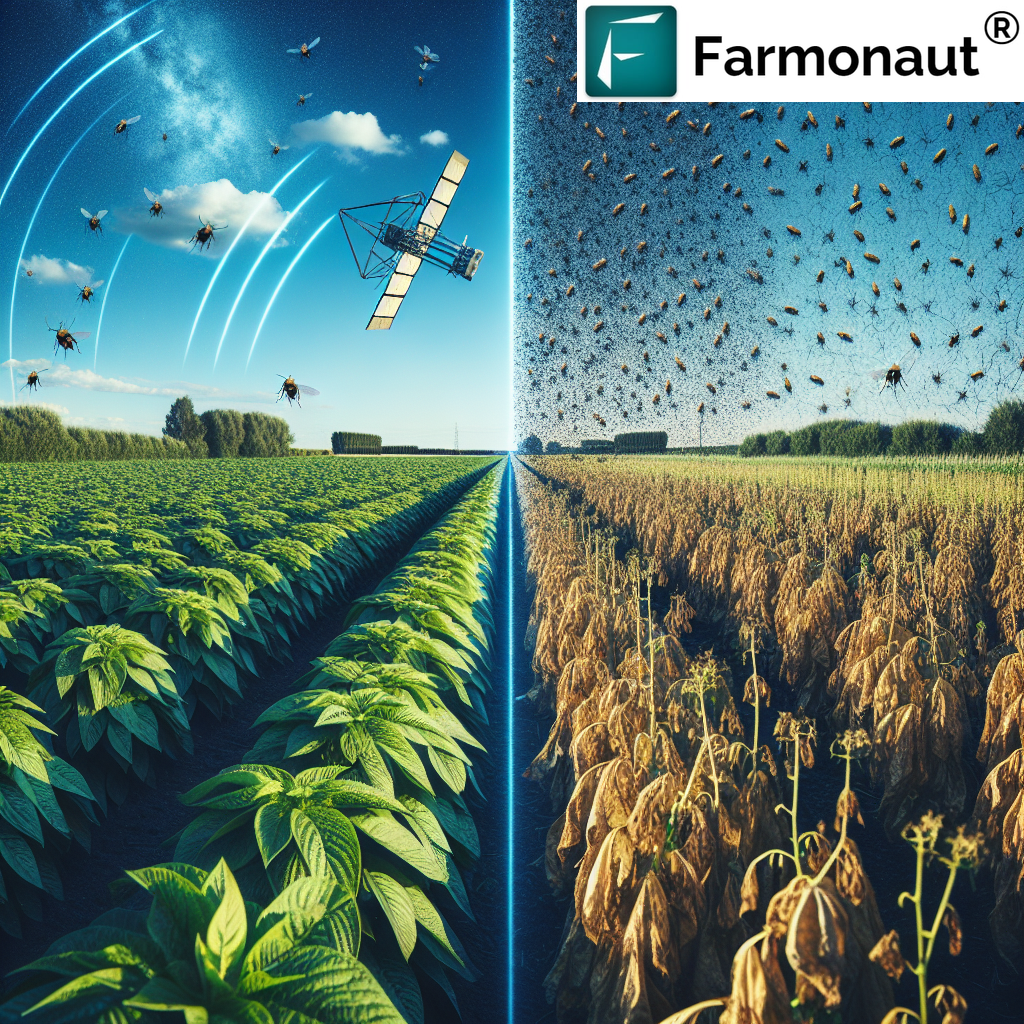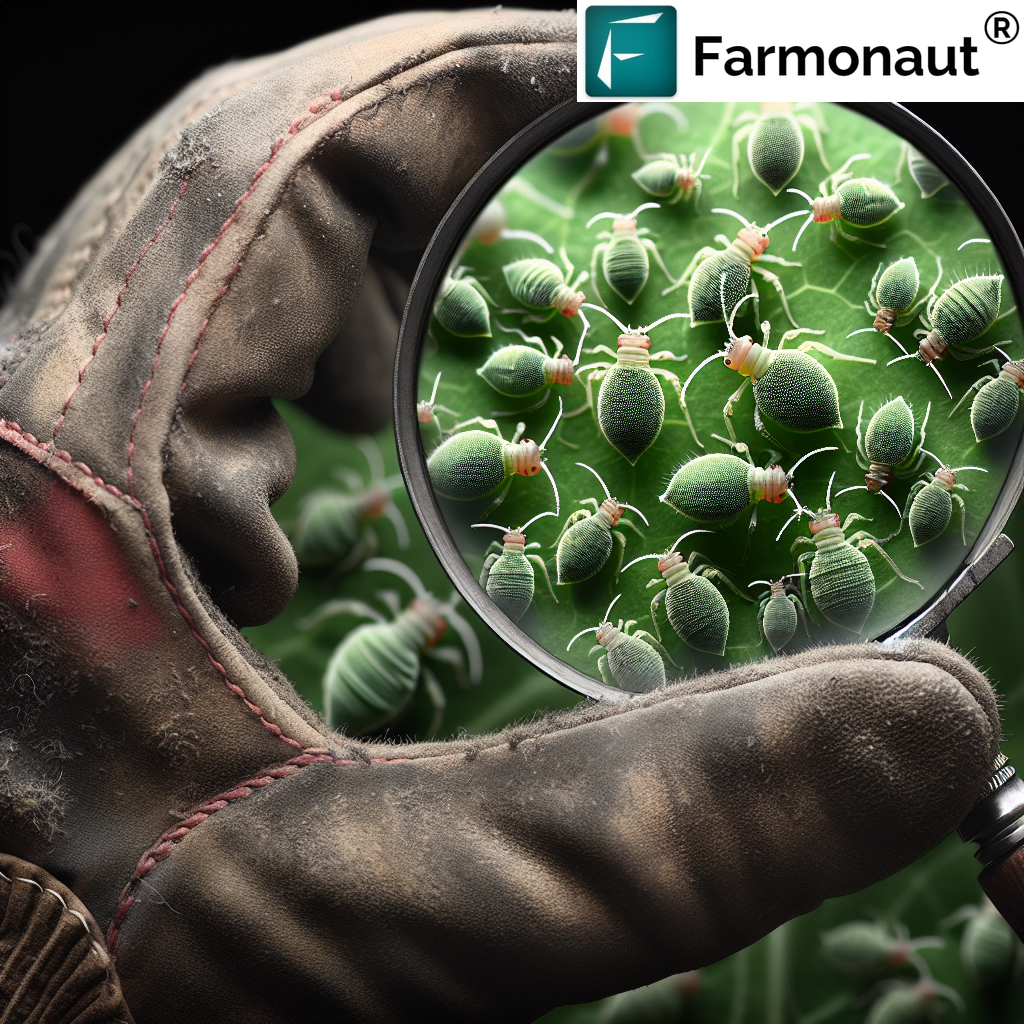Combating Aphids: Smart Pest Management Strategies for Farmers

As agricultural technology experts at Farmonaut, we understand the critical challenges farmers face when dealing with pests, particularly aphids. These tiny yet destructive insects can wreak havoc on crops, leading to significant yield losses and economic setbacks. In this comprehensive guide, we’ll explore effective strategies to combat aphids, leveraging both traditional methods and cutting-edge technologies like satellite-based monitoring systems.
Understanding Aphids: The Silent Crop Destroyers
Aphids, often referred to as plant lice, are small, soft-bodied insects that feed on plant sap. These pests can be found in various colors, including green, black, brown, and even pink. Despite their small size, aphids can cause substantial damage to crops due to their rapid reproduction rate and their ability to transmit plant viruses.
Why Aphids Are a Major Concern for Farmers
- Rapid Reproduction: Aphids can reproduce asexually, allowing populations to explode quickly.
- Diverse Host Range: They can infest a wide variety of crops, from vegetables to fruit trees.
- Virus Transmission: Aphids are known vectors for numerous plant viruses.
- Nutrient Depletion: By feeding on plant sap, they deprive plants of essential nutrients.
- Honeydew Production: Aphids excrete a sticky substance that can lead to the growth of sooty mold on leaves.
Identifying Aphid Infestations
Early detection is crucial in managing aphid populations. At Farmonaut, we emphasize the importance of regular crop monitoring. Here are some signs to look out for:
- Curling or distorted leaves
- Stunted plant growth
- Presence of sticky honeydew on leaves
- Sooty mold growth on plant surfaces
- Visible clusters of small insects on the undersides of leaves or along stems
Integrated Pest Management (IPM) for Aphid Control
At Farmonaut, we advocate for an Integrated Pest Management approach to combat aphids effectively. This strategy combines various control methods to minimize environmental impact while maximizing pest control efficiency.
1. Cultural Control Methods
- Crop Rotation: Implementing a diverse crop rotation plan can disrupt aphid life cycles.
- Companion Planting: Growing plants that repel aphids or attract beneficial insects can help control populations naturally.
- Proper Plant Spacing: Adequate spacing between plants improves air circulation, making the environment less favorable for aphids.
- Water Management: Avoid over-watering, as excess moisture can create conditions conducive to aphid growth.
2. Biological Control
Encouraging natural predators is an eco-friendly way to manage aphid populations. Some effective biological control agents include:
- Ladybugs (Ladybirds)
- Lacewings
- Parasitic wasps
- Hoverflies
- Praying mantises
These beneficial insects can be introduced to your fields or attracted through habitat management practices.
3. Mechanical Control
For smaller infestations or in greenhouse settings, mechanical control methods can be effective:
- Water Sprays: A strong jet of water can dislodge aphids from plants.
- Pruning: Removing heavily infested plant parts can help control the spread.
- Sticky Traps: Yellow sticky traps can capture flying aphids and monitor population levels.
4. Chemical Control
While we at Farmonaut promote sustainable farming practices, we recognize that in severe infestations, chemical control may be necessary. However, it should be used judiciously and as a last resort:
- Insecticidal Soaps: These are less harmful to beneficial insects and the environment.
- Neem Oil: A natural insecticide that can effectively control aphid populations.
- Synthetic Insecticides: Should be used sparingly and only when other methods have failed.
Always follow local regulations and guidelines when using any chemical control methods.
Leveraging Technology for Aphid Management
At Farmonaut, we’re at the forefront of integrating advanced technologies into pest management strategies. Our satellite-based monitoring system offers several advantages in the fight against aphids:
Satellite-Based Crop Health Monitoring
Our advanced satellite imagery technology allows farmers to detect changes in crop health that may indicate aphid infestations:
- Early Detection: Identify potential problem areas before they become visible to the naked eye.
- Large-Scale Monitoring: Efficiently monitor vast agricultural areas for signs of stress or infestation.
- Regular Updates: Receive frequent updates on crop health, allowing for timely interventions.
To learn more about our satellite monitoring capabilities, visit Farmonaut’s Satellite Monitoring Platform.
AI-Powered Advisory System
Our Jeevn AI Advisory System provides personalized recommendations for aphid management:
- Customized Strategies: Receive tailored advice based on your specific crop, location, and infestation levels.
- Predictive Analytics: Anticipate potential aphid outbreaks based on historical data and current conditions.
- Integrated Approach: Get recommendations that combine various control methods for optimal results.
Weather Forecasting and Pest Risk Assessment
Aphid populations are heavily influenced by weather conditions. Our platform integrates weather data to help you make informed decisions:
- Temperature Monitoring: Track temperature trends that may affect aphid reproduction rates.
- Precipitation Forecasts: Plan your pest management activities around expected rainfall.
- Wind Pattern Analysis: Predict potential aphid migrations based on wind patterns.
For access to our comprehensive weather API, visit Farmonaut’s Weather API.
Comparing Farmonaut’s Satellite System with Drone and IoT-Based Monitoring
| Feature | Farmonaut Satellite System | Drone-Based Monitoring | IoT-Based Monitoring |
|---|---|---|---|
| Coverage Area | Large-scale (Thousands of hectares) | Limited (Hundreds of hectares) | Very Limited (Specific points) |
| Frequency of Updates | Regular (Every few days) | On-demand (Manual flights) | Real-time (Continuous) |
| Initial Setup Cost | Low | High | Medium to High |
| Operational Complexity | Low (Cloud-based) | High (Requires skilled operators) | Medium (Requires maintenance) |
| Weather Dependency | Low | High | Medium |
| Data Processing | Automated (AI-driven) | Semi-automated | Automated |
| Scalability | Highly Scalable | Limited Scalability | Moderately Scalable |
The Future of Aphid Management
At Farmonaut, we’re continuously innovating to stay ahead of evolving pest challenges. Some exciting developments on the horizon include:
- Enhanced AI Models: More accurate prediction of aphid outbreaks based on complex environmental factors.
- Integration with IoT Devices: Combining satellite data with ground-level sensors for even more precise monitoring.
- Automated Drone Deployment: Using satellite data to guide targeted drone inspections for detailed pest assessments.
- Blockchain-Based Pest Management Records: Ensuring transparency and traceability in pest control practices, especially for organic farmers.
Conclusion: A Holistic Approach to Aphid Control
Effective aphid management requires a multifaceted approach that combines traditional farming wisdom with cutting-edge technology. At Farmonaut, we’re committed to providing farmers with the tools and knowledge they need to combat these persistent pests efficiently and sustainably.
By leveraging our satellite-based monitoring system, AI-powered advisories, and comprehensive weather data, farmers can stay one step ahead of aphid infestations. This proactive approach not only helps protect crops but also promotes more sustainable farming practices by reducing the reliance on chemical pesticides.
Remember, the key to successful aphid management lies in early detection, informed decision-making, and integrated control strategies. With Farmonaut’s advanced agricultural technologies, you’re well-equipped to tackle the challenge of aphids and other crop pests head-on.
Get Started with Farmonaut
Ready to revolutionize your approach to pest management? Explore our range of solutions:
- Download our mobile app:
Android |
iOS - Access our API documentation for developers
- Subscribe to our services:
Frequently Asked Questions (FAQ)
Q: How quickly can Farmonaut’s satellite system detect aphid infestations?
A: Our satellite system can detect early signs of crop stress, which may indicate aphid infestation, within days of the problem developing. The exact timeframe depends on factors such as infestation severity and weather conditions.
Q: Is Farmonaut’s technology suitable for small-scale farmers?
A: Absolutely! We offer scalable solutions that cater to farms of all sizes. Our mobile app provides accessible tools for small-scale farmers to benefit from satellite-based insights.
Q: How does Farmonaut’s system differentiate between aphid damage and other types of crop stress?
A: While our satellite imagery can detect general crop stress, our AI algorithms analyze patterns in the data, combined with weather information and historical pest data, to provide likely causes. For definitive identification, we recommend ground-truthing in conjunction with our technology.
Q: Can Farmonaut’s system work in areas with frequent cloud cover?
A: Yes, our system uses various satellite sources and advanced algorithms to mitigate the impact of cloud cover. While persistent clouds can affect data quality, we strive to provide useful insights even in challenging conditions.
Q: How often is the satellite data updated?
A: Our standard plans offer updates every 3-5 days, depending on the satellite pass and weather conditions. Premium plans may offer more frequent updates.
Q: Does Farmonaut provide support for implementing the recommended pest control strategies?
A: While we don’t directly implement pest control measures, our AI advisory system provides detailed recommendations. We also offer customer support to help you interpret the data and advice provided by our platform.
Q: How does Farmonaut ensure the privacy and security of farm data?
A: We take data security seriously. All farm data is encrypted and stored securely. We adhere to strict privacy policies and never share individual farm data without explicit consent.
Q: Can Farmonaut’s system be integrated with other farm management software?
A: Yes, we offer APIs that allow for integration with various farm management systems. Our developer documentation provides details on how to incorporate our data into other platforms.
Q: What kind of return on investment can farmers expect from using Farmonaut’s aphid management tools?
A: While results vary depending on factors such as crop type, location, and existing management practices, many of our users report significant reductions in pest-related losses and pesticide use. This often translates to improved yields and reduced input costs.
Q: Does Farmonaut offer training on how to use its platform effectively?
A: Yes, we provide comprehensive onboarding and ongoing training resources, including video tutorials, webinars, and personalized support to ensure you get the most out of our technology.

By embracing a combination of traditional wisdom and cutting-edge technology, farmers can effectively manage aphid populations and protect their crops. Farmonaut’s comprehensive suite of tools empowers farmers to make data-driven decisions, implementing targeted and timely interventions against these persistent pests. As we continue to innovate and refine our technologies, we remain committed to supporting sustainable agriculture and helping farmers around the world achieve better yields with fewer resources.